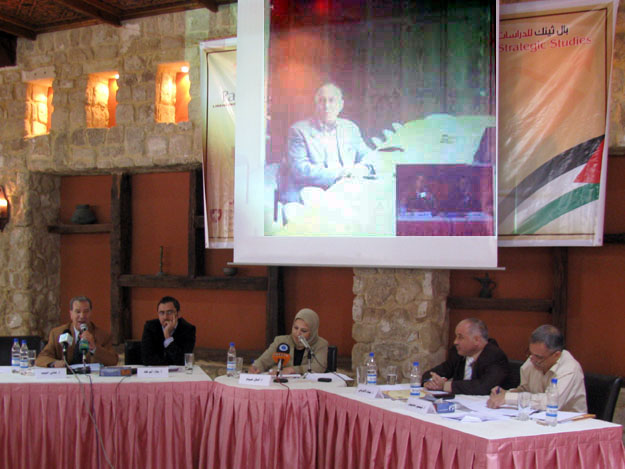In a conference entitled ” Empowering the Role of Community in the National Reconciliation” organized by Pal think for Strategic Studies in Gaza city, intelligentsia , journalists, jurists, and representatives of the Palestinian political, social, academic forces confirmed on the necessity to restore the national unity in the West Bank and the Gaza strip; end the geopolitical division, and the political division. They stressed on the importance to grip the most real opportunity proposed by Egypt, to end the geopolitical division and restore the national unity on 25 of October.
Omar Shaaban, president of Pal Think for Strategic Studies talked over the lost efforts resulted from the internal fighting Palestinian people and the struggle among the political forces, the competition to reach the power have resulted to transfer the struggle with the occupation to internal struggle among the Palestinians which would provide catastrophes to the Palestinian people.
He spoke on the burning desire of the Israeli occupation to build settlements, build the housing units in Jerusalem, and complete building the wall.
He stressed on the role of Pal Think as an strategic think tank in Gaza to bridge the political gap between the struggled factions, and look neutrally and objectively to the sticky issues to achieve the sustainable reconciliation.
Shaaban concluded his speech by saying” I hope 25 of October to be the stemming point to reconciliation and restoration of the national unity”
Jean-Daniel Ruch, Special Representative of Switzerland to the Middle East, voiced much importance to the audience of the conference in Gaza, referring to the role of the Swiss government to heal objectively and neutrally, on all the sides, the rift in the Palestinian arena. He said that the Palestinians lost many important chances of achieving the national reconciliation in the past, and nowadays, there is a new chance to go forward and restore the national unity.
Within his visit to Gaza , Monieb Al-Masri, chairman of the independents’ committee in the reconciliation sessions in Cairo hopes that the current dialogue in Gaza to end all the problems and the struggle among the factions and to be a real national reconciliation. He said, after meeting with the PA president, Mahmoud Abbas, and the Palestinian premier in the retired government in Gaza, that the chances for achieving real reconciliation are positive.
Dr. Mahdi Abdul El-Hadi, the director of Palestinian Academic Society for the Study of International Affairs in Jerusalem (PASSIA), talked over the lost Palestinian case among the factions and the political parties which had a positive role to curl the goals of Judaizing the Jerusalem, and spoil the plans of the occupation to destroy the Palestinians, but now, the Palestinian are deep sleeping in the internal fighting and forgot Jerusalem and the right of return. He added what is happening now is the lost of the Palestinian identity in a well-planned method and with an international coverage and the pretext will be the Palestinian division and there is no real Palestinian partner.
Hani Habib, developer of the paper entitled” the Role of the Media Means in Achieving Reconciliation”, urged to invest all the mass media outlets toward the culture of dialogue, the national reconciliation, enhancing the culture of dialogue, acceptance of the other, and rejecting the factions’ mobilization which negatively affect on the social fabrics of the Palestinian community.
In his commenting on the paper of Hani Habib, Emad El-Afranji, chairman of the Palestinian journalists’ media forum, called upon establishing a supreme council for the media affairs, to monitor the Palestinian media and to pinpoint a finger on the wrong or provoked outlet.
In a paper entitled “the Role of the Civil Society in Achieving Reconciliation developed by the development researcher, Alaa Abu Taha, he confirmed on the contribution of the Palestinian NGO’s in achieving reconciliation through various initiatives and activities to the Palestinian society, adding that the reach to reconciliation are higher than the capabilities of NGO’s.
Within the 2nd session of the conference, Mazin Ejlah, an economic expert talked over the huge loses of “Operation Cast Lead on the people, properties and the public utilities. He said that most of reconstruction reports were prepared hastily and the differences of the estimation refer to the differences of the approaches used to estimate the loses, and the short duration which last just one month after the end of the offensive.
On the development of the reconstruction issue after the War, he added that several local initiatives were appeared in the West Bank and Gaza strip to quickly reconstruct the war-torn Gaza, including the program of “Cash Emergency Support”, “Reconstruction of Gaza and the Private Sectors”;” Reconstruction of Private Housing”, in addition to Reconstructing the Utilities of the Private Sector” which was due to carry out in cooperation with the Palestinian Authority, the European Commission, and Palestinian private sector; the last program was the reconstruction of agriculture , livestock, and fisheries sectors; furthermore, a National Plan for the Early Recovery had also been prepared for the Gaza strip providing the semi-final estimations of the loses.
During his comment on the paper entitled” vision to administer the Gaza crossings”, Ghazi Hamad, minister of the Gaza crossings, said that the closure of the crossing is a sticky problem and it should be completely and simultaneously ended and that the crossings are for easing the lives of the citizens and the travelers. He hopes that the crossing crisis is to be resolved in the upcoming reconciliation accord.
At the end of the conference, Ahmed Yousif, the political advisor hoped that the reconciliation will be the outcome of the rounds of talk in Cairo, referring to the necessity to abide the two sides with decisive resolutions to end the struggle and restore the national unity.



